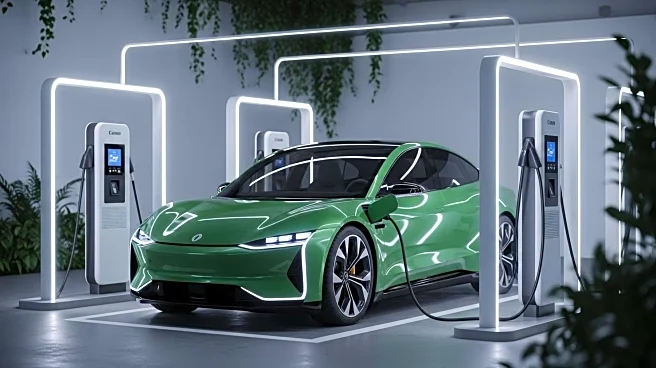What's Happening?
The Electric Vehicle Council (EVC) has reported a significant increase in the sales of electric vehicles (EVs) in Australia, with 12% of new vehicle sales between January and June being battery electric or plug-in hybrid models. This marks an increase from 9.6% during the same period last year. As more drivers transition from internal combustion engine vehicles to EVs, they are experiencing various benefits and challenges associated with the new technology. Key features such as one-pedal driving and regenerative braking are highlighted by drivers for their simplicity and efficiency. One-pedal driving allows drivers to control acceleration and braking with a single pedal, while regenerative braking recovers energy during braking to recharge the battery. Drivers have also noted the environmental benefits, such as reduced noise and air pollution, and the cost savings associated with home charging, especially when paired with solar energy.
Why It's Important?
The shift towards electric vehicles is crucial for reducing carbon emissions and combating climate change. As EV sales continue to rise, the automotive industry is likely to see significant changes in manufacturing, infrastructure, and consumer behavior. The adoption of EVs can lead to cleaner air in urban areas, reducing health risks associated with air pollution. Additionally, the economic impact includes potential savings for consumers on fuel and maintenance costs, as well as the growth of industries related to EV technology and renewable energy. The transition also poses challenges, such as the need for widespread charging infrastructure and adjustments in driving habits, which could influence public policy and investment strategies.
What's Next?
As the popularity of electric vehicles grows, further developments in charging infrastructure and technology are expected. Governments and businesses may increase investments in EV charging stations, particularly in rural and underserved areas, to support long-distance travel and broader adoption. Automakers are likely to continue innovating, offering more models with advanced features and longer ranges. Public policy may evolve to incentivize EV purchases and support renewable energy integration, potentially leading to new regulations and subsidies. Consumer education and training on EV technology will be essential to ensure safe and efficient use.
Beyond the Headlines
The transition to electric vehicles may have deeper implications for societal norms and urban planning. As cities become less reliant on fossil fuels, there could be a shift towards more sustainable living environments, influencing public transportation systems and urban design. The cultural perception of driving and car ownership may change, with increased emphasis on environmental responsibility and technological advancement. Ethical considerations regarding the sourcing of materials for EV batteries, such as lithium and cobalt, may also come to the forefront, prompting discussions on sustainable mining practices and fair labor conditions.









